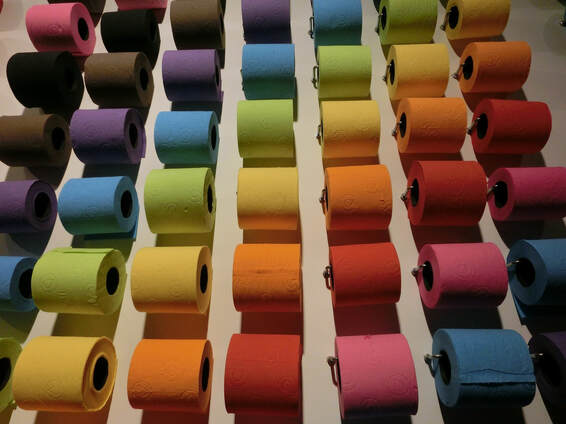I personally don't find toilet paper such an essential. But it got me thinking of the things we take for granted in our everyday. I turn on the tap and CLEAN water flows, I press a switch and the light comes on. When I was growing up in Malaysia in the 1970-80s, we had power outages, sometimes for days and then the water pumps wouldn't work, so when the tap got turned, nothing flowed. I lived in Petaling Jaya, close to the capital city, so if we didn't have water, a lot of other places in Malaysia would have it worse. I learned very early on not to take these very basic things for granted. I learned then that toilet paper isn't such an essential, especially if you can't flush the toilet, where do you put the toilet paper?
I walk into a grocery store here and I see possibly 10 different brands of toilet paper; from 3-ply to 5-ply, super soft to silky soft, with Chamomile to Gold Melissa extract, or FSC-certified to recycled paper. It's crazy the choices we are faced with at just the toilet paper shelf. I started to look closer at the labels on the packaging. I personally am interested in environmentally-friendly products so I pay attention to recycling information. They are very deceiving. Some have a recycled-sign on the packet but when you look closer, it states that it's the packaging that is recycled not the paper.
I looked a little further on where our toilet paper comes from and I was horrified. I watched a documentary on FSC, Forest Stewardship Council, about how their certification of paper and wood products functions and who runs it. FSC was a council of environmental groups, like Greenpeace, Indigenous people from around the world and the timber companies, who wanted to do sustainable managing of the forests of the world. Turns out, this WAS the case but not anymore. Watch the documentary to find out more. I found out where our toilet paper is coming from. If it is recycled paper, then it is locally or European produced. If not, it is coming from trees, like Eucalyptus, which were grown in place of primeval forest because they grow faster and can be cut down faster. When we refer to primeval forests, we are talking about forest with trees and a whole ecosystem, of over a couple of hundred years old, of which we do not have any more of in Switzerland and most of Western Europe. We, consumers of these products and beings of the earth, have been deceived. If you did not pay attention to the fine-printed details, it is time you did. Too many things have been done in the name of "recycling," "caring for Mother Earth and the environment" etc. but, they are nothing more than ways to sell more products, help us consumers have a better conscience so we buy more and fill the pockets of these companies. Greenwashing for more profit!
It is time to act. Use less, buy less, recycle and reuse. It is only a small step but a choice we make. We don't need the newest smartphone, which by the way requires the use of rare earth, or new clothes. These are/will be relics of a time when we consumed without thought of where or what or whom we were affecting. The next time you rip that toilet paper, remember that we are all connected. That piece of toilet paper may have come from a Eucalyptus tree, grown in place of a clear-cut rainforest, which housed thousands of species of plants, insects, animals and indigenous people, who now are extinct or on the verge of extinction. Maybe many of us were revolted by the hoarding of toilet paper because it displayed to us this ugly side of humanity, this irreverent part of us that consumes without regard for those around us. Become aware and awake of what you can do. There is a saying in Malay, "Sedikit-sedikit, lama-lama menjadi bukit," which translates as "little by little over time creates a hill" - Our small actions over time will create change.
Image by katharinakanns from Pixabay


 RSS Feed
RSS Feed